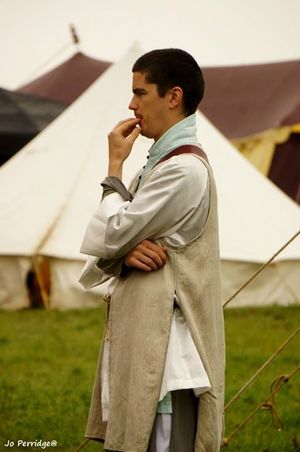Urizen leadership
Magic is seen as a mark of a rational and learned mind and more importantly as the most powerful tool that an individual or group can wield. The Urizen maintain that those who best understand the world are the ones best suited to lead it, and they look to their most powerful mages for leadership. Every citizen is encouraged to learn a little magic, whether it is practical spellcasting or superior craftsmanship, but ritual magic, the mastery of the lore of the Realms, is regarded as the highest calling.
Most Urizen spires appoint an arbiter whose role is to resolve disputes, and represent the spire to others. Traditionally the individual who is deemed to demonstrate the most complete Arete is asked to take the position. In most spires this will be the wisest and most skilled mage, but a martial spire is more likely to choose a weapon-master than a magician.
There is little history of open military conflict between Urizen spires. Cooperation between neighbours is the norm in Urizen, but disputes between spires whose councils differ on political, social or ideological grounds are commonplace. Even before Urizen joined the Empire, such conflicts were almost always settled through debate, often with the assistance of a judge or mediator from a neutral spire.
Urizen are passionate about politics. Being able to debate competing points of view and achieve consensus is seen as a high art form that raises humans above animals. It also makes civilised people superior to barbarians who practice brute force approaches to leadership. The Imperial Senate is held up as a great triumph of the Empire, although they are often disappointed by the way the other nations choose to exploit the Senate, especially how they pick their Senators.
Leading a territory
Urizen Senators are determined by magical ability. All Urizen who live in a contested territory are eligible to vote, provided they demonstrate some mastery of ritual magic. Each spire in the contested territory can put forward a candidate, and each citizen receives a number of votes based on the breadth and depth of their Realm lore skills. The candidate with the highest number of votes becomes the Senator for the territory
Candidates are encouraged to engage in open debate about their intentions, political views and agendas while the election is taking place, leaving votes to be collected by civil servants or representatives of the spire in question. The Egregore often chairs the debates, although it is not uncommon for a third-party mediator to be selected from outside the territory.
An Urizen who moves from one territory to another may encounter some obstacles to voting; if they voted in the elections for their old territory, they cannot vote in the election for their new territory until a year has passed since they last voted to appoint a senator.
Many Urizen dream of a utopia and strive to share that dream with the Empire, partly by example and partly through education. The belief is that the wisest and most educated should lead by example, and that mages who have the greatest understanding of the cosmos and the greatest personal power should shepherd their fellow humans for the good of all.
The senators for each Imperial territory are re-elected at specific equinox and solstices during the year. The senator for Redoubt is elected at the Summer solstice, the senator for Morrow is elected at the Autumn equinox, the senator for Zenith is elected at the Winter solstice and the senator for Spiral is elected at the Spring equinox.
Tallying the votes
Any Urizen magician who lives in the territory is eligible to vote, provided they have at least one rank of ritual magic skill. The number of votes each magician is eligible to case is based on the triangular number of ranks they have in each lore. This means that a character receives one vote for each character point they have spent on realm lore - so a character with three ranks in one realm lore has the same number of votes as a character with one rank in each realm lore. Magic items and other temporary bonuses (such as from a potion or enchantment) do not count, nor do experience points spent to master extra rituals.
There are three principles in a person's being and life, the principle of thought, the principle of speech, and the principle of action. The origin of all conflict between me and my fellow-people is that I do not say what I mean and I do not do what I say.
Torchbearers
One of the most active political movements in Urizen is that of the torchbearers. This loose society is dedicated to uncovering the truth about important events and reporting their findings to as many people as possible. They adhere to a philosophy that suggests the only way to ensure the Empire remains "honest" is to ensure that the citizens are kept informed of what is going on around them, so they can make sensible decisions and appoint virtuous Senators. They dislike secrets, especially political secrets. The torchbearers regularly clash with those who rely on secrecy to get their work done, and with the Highborn archivists who are often frustrated by their insistence on spreading information to everyone without any regard for the potential repercussions.
The torchbearers are drawn to places where important events have happened. Some live among strangers, to learn as much about them as they can and help spread understanding between nations. Some are active in ensuring that the citizens of the Empire receive a good education. Others dedicate themselves to certain specific forms of truth – they become battle observers or political commentators. Most are involved in writing and publishing journals or pamphlets, or maintain a wide circle of correspondents with whom they share their findings.
There is no formal torchbearer organization, and not all torchbearers are Urizen. Those who feel a strong affiliation for this philosophy tend to wear a badge, pin or piece of jewellery in the shape of a lit torch, to allow easy identification of other sympathisers.

